This content originally appeared on Democracy Now! and was authored by Democracy Now!.
This post was originally published on Radio Free.
This content originally appeared on Democracy Now! and was authored by Democracy Now!.
This post was originally published on Radio Free.
This content originally appeared on Democracy Now! and was authored by Democracy Now!.
This post was originally published on Radio Free.
This content originally appeared on Democracy Now! and was authored by Democracy Now!.
This post was originally published on Radio Free.
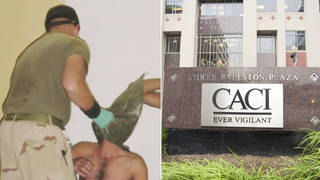
A federal jury in Virginia has ordered the U.S. military contractor CACI Premier Technology to pay a total of $42 million to three Iraqi men who were tortured at the notorious Abu Ghraib prison. The landmark verdict comes after 16 years of litigation and marks the first time a civilian contractor has been found legally responsible for the gruesome abuses at Abu Ghraib. We discuss the case and its significance for human rights with Baher Azmy, the legal director for the Center for Constitutional Rights, which represented the Abu Ghraib survivors. “This lawsuit has been about justice and accountability for three Iraqi men — our clients, Salah, Suhail and Asa’ad — who exhibited just awe-inspiring courage and resilience,” he says.
This content originally appeared on Democracy Now! and was authored by Democracy Now!.
This post was originally published on Radio Free.
This content originally appeared on Democracy Now! and was authored by Democracy Now!.
This post was originally published on Radio Free.
This content originally appeared on Democracy Now! and was authored by Democracy Now!.
This post was originally published on Radio Free.
ATLANTA – The leaves were turning red and orange at Georgia Institute of Technology on a recent afternoon, and students were studying for midterms. Yet within this quiet haven, a global conflict has raged.
Georgia Tech, as the university is known, has been pulled into the geopolitical strife between the United States and China. A group of U.S. lawmakers say that Chinese officials have been trying to pilfer research from Georgia Tech and other American universities and use their resources to strengthen China’s military.
In a September report, Republican members of two separate committees in the House of Representatives said that Beijing has been benefiting from the U.S.-funded research done at Georgia Tech and other universities in this country.
The report claimed that research intended to help the U.S. military has inadvertently given a boost to the Chinese armed forces by allowing Chinese researchers access to knowledge and technology that could ultimately have militaristic ends.
Chinese scientists have managed to obtain such resources through joint U.S.-China educational initiatives and similar programs, the report said. American research is being used to develop Chinese semiconductors, artificial intelligence and military technology, it warned.
The new Trump administration could mean that the U.S.-China university partnerships and exchange programs will be placed under even more scrutiny, say academics and experts in the field. David Zweig, the author of a new book, “The War for Chinese Talent in America,” told RFA that university administrators may face now increased pressure.
“It puts those exchanges at greater risk,” Zweig said, referring to the U.S.-China university partnerships. It may be “that the new administration will investigate the exchange programs or will stop them, or they will broaden what is seen as threats to national security.”
He and others worry the claims of the Republican lawmakers are too far-reaching and are unnecessarily shuttering much-needed research programs. At least one American scientist who worked on such projects denied allegations made in the recent congressional report, telling Reuters the research was both early-stage and all in the public domain.
The discussion around these tensions is the latest in long running disputes over the role of U.S. higher education in competition with China. Amid shifting dynamics in U.S-China relations, students are often paying the price.
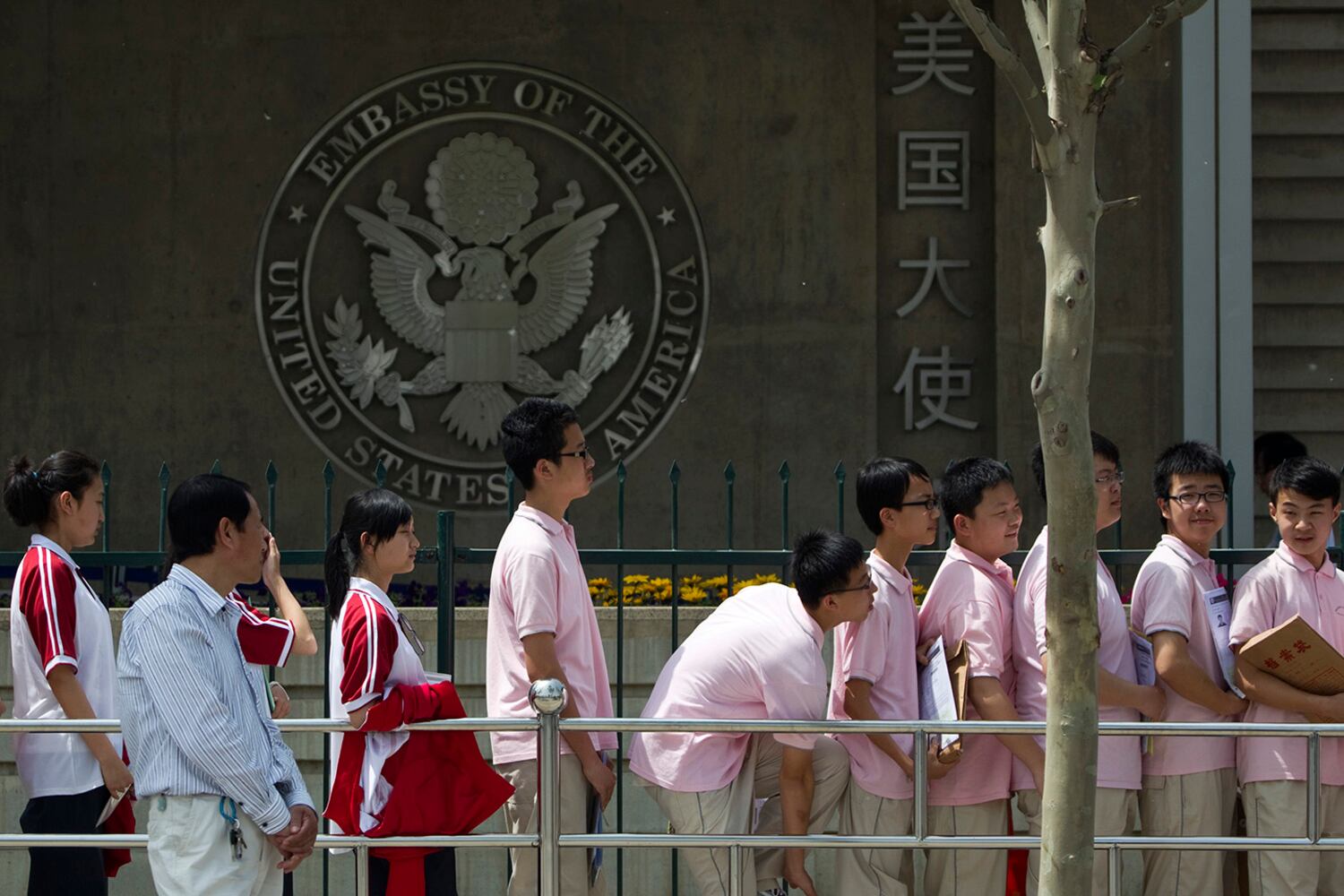
Ripple effects
Those dynamics today are testy. The mood in the U.S. now is one that, regardless of party, politicians agree that China poses a danger to this country.
“Anything having to do with China right now—you’re able to score political points by being the most hawkish,” said Margaret Kosal, an associate professor of international affairs at Georgia Tech.
A defense policy bill, the National Defense Authorization Act, expected to pass this year, will likely include provisions against China and warnings to U.S. universities in particular; universities could even be blocked from receiving U.S. Defense Department funds for some research.
Chinese officials say that academic exchanges promote better understanding between the two cultures and do not pose a threat to the United States. Liu Pengyu, a spokesperson for the Chinese embassy in Washington, told RFA in an email that the accusations from the U.S. lawmakers are unwarranted. Liu criticized lawmakers for “blocking normal scientific research exchanges and cooperation between the two sides in the name of ‘national security.’”
RELATED STORIES
Experts warn of renewed Chinese Communist Party ‘cognitive warfare’ on US campuses
US State, Education Officials Call For Review of Confucius Institutes
Hongkongers warn of Chinese Communist Party infiltration of British universities
Chinese influence at universities has been a long-running issue, especially regarding the study of technology. In 2018, Congress restricted federal funding to schools with the Chinese cultural programs known as the Confucius Institutes because of concerns about influence operations. Since then, nearly all these programs have been shut down.
Besides Georgia Tech, the September government report also scrutinized University of California, Berkeley, and its relationship with a non-profit, Tsinghua-Berkeley Shenzhen Institute, in Shenzhen.
In a statement, Dan Mogulof, an assistant vice chancellor at Berkeley, said they “take concerns about research security very seriously” and have “implemented new processes to foster and monitor foreign collaborations.”
They are currently bringing their relationship with the Tsinghua-Berkeley Shenzhen Institute to an end, he added.
They would not be the first. In 2023, a law was passed in Florida that imposes restrictions on public universities and their ability to receive grants from educational institutes in China. Afterwards, the Marriott Tianjin China Program, a prominent hospitality management program affiliated with Florida International University, was closed down.
Abbigail Tumpey, a vice president at Georgia Tech, told RFA that their program in China, the Georgia Tech Shenzhen Institute, was established decades ago for educational purposes and had nothing to do with military research. Nevertheless, she and her colleagues at Georgia Tech all agreed that it was best to wind down their program in China.
The wind-down has impacted students. Several hundred are currently enrolled in the program in China. They will be able to complete their degrees, but they will be the last to do so. More broadly, the number of Chinese students in the U.S. has fallen from over 370,000 in 2019-2020 to fewer than 290,000 in 2022-2023. About 800 US students studied in China this year compared to 11,000 before the pandemic.
Zoë Altizer, a neuroscience major born in China who is studying at Georgia Tech’s main campus in Atlanta, said she believes that the university’s decision to pull back from China has been a consequence of “the ever-strange relationship between the two countries.”
Students and graduates of Florida universities have also been talking about the new restrictions on the schools and programs.
Annie Dong, 22, a native Floridian who spent part of her childhood in Fuzhou, China, was thrilled to find a “home,” as she put it, in the Chinese Language and Culture department at a progressive state university, New College of Florida, in Sarasota. She studied art and painted a mural on the wall of a campus gallery in the fall of 2022. The mural showed images of red-crowned cranes, birds with “strong symbolism in Chinese culture,” she said. “It means longevity and luck. It means you’re able to take on a long journey.”

Several other students also painted murals. Then, the atmosphere on campus changed amid tightening restrictions on university affiliations with institutes in China.
Around that time, the murals on the New College campus were painted over. But some, including Dong, felt that it was a symptom of a culture less welcoming to diverse students. “They said it was a way to beautify the campus,” Dong said. (A university spokesman declined to comment on the matter.)
“I felt like, really, where is home now, if they’re not welcoming color and diversity. How does that make sense?” she said.
This content originally appeared on Radio Free Asia and was authored by Tara McKelvey.
This post was originally published on Radio Free.
This content originally appeared on Democracy Now! and was authored by Democracy Now!.
This post was originally published on Radio Free.
This content originally appeared on Democracy Now! and was authored by Democracy Now!.
This post was originally published on Radio Free.
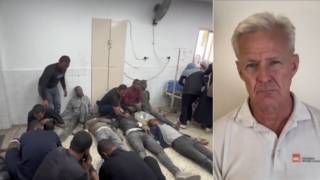
Top U.N. officials are again warning that the entire Palestinian population in north Gaza is “at imminent risk of dying from disease, famine and violence.” At least 1,800 Palestinians have been killed, many of them children, since October, when Israel imposed a draconian siege and began an intensified campaign of ethnic cleansing on northern Gaza. Jan Egeland of the Norwegian Refugee Council recently spent several days in Gaza. He describes what he saw as “devastation beyond belief,” as Palestinians face “the most intense and most indiscriminate bombardment anywhere in the world in recent memory,” coupled with the utter depletion of aid. Egeland pleads for the United States, the largest supplier of military funding and equipment to Israel, to condition its weapons to Israel, enforce the provision of aid and commit to ending Israel’s assault. “It’s not in Israel’s interest to destroy its neighborhood in Gaza and in Lebanon. It will create new generations of hatred,” Egeland says.
This content originally appeared on Democracy Now! and was authored by Democracy Now!.
This post was originally published on Radio Free.
This content originally appeared on Radio Free Europe/Radio Liberty and was authored by Radio Free Europe/Radio Liberty.
This post was originally published on Radio Free.
This content originally appeared on Radio Free Europe/Radio Liberty and was authored by Radio Free Europe/Radio Liberty.
This post was originally published on Radio Free.
This content originally appeared on Radio Free Europe/Radio Liberty and was authored by Radio Free Europe/Radio Liberty.
This post was originally published on Radio Free.
China has refrained from commenting on the U.S. election, insisting it is its internal affair, and called on Wednesday for respect and cooperation but its state-controlled media has reflected concerns and hopes, with one newspaper calling for the new president, whoever it may be, to stop a deterioration in ties.
Foreign ministry spokesperson Mao Ning told a press briefing, as reports indicated that former president Donald Trump was heading for victory, that China’s policy towards the United States was consistent.
“We will continue to view and handle Sino-U.S. relations in accordance with the principles of mutual respect, peaceful coexistence, and win-win cooperation,” Mao said.
But the China Daily, in a commentary titled “Onus on new US president to improve ties,” expressed frustration with “U.S. hawks” for the deterioration in Sino-US relations.
“No matter who wins the election, the result will have a far-reaching impact on the world, not least because the winner will decide the U.S.’s China policy,” Chinese academics Fu Suixin and Ni Feng wrote in the commentary.
Both of the U.S. presidential candidates had played the “China card” to win votes, the academics said.
While U.S. voters “generally do not understand or care about foreign policy, the country’s elites have always formulated the foreign policy and shaped public opinion,” they said.
“Both Democrats and Republicans make China a scapegoat for the U.S. domestic mess,” they wrote. “The voters have to pay the cost of the deteriorating China-U.S. relations.”
“The new U.S. administration, therefore, should give up the illusion of having a consensual China policy, and reflect on the costs of undermining Sino-U.S. relations over the past eight years — and honestly tell the American people the truth about China,” they said.
The China Daily published an opinion piece on China-U.S. relations on Tuesday written by the former prime minister of Kyrgyzstan, Djoomart Otorbaev, titled “Rebuilding Sino-US trust crucial for world.”
Otorbaev said in recent years hostility between the U.S. and China “has escalated to the point where the possibility of not just a cold war but even a hot war is becoming threateningly real.”
“Beijing and Washington are competing with each other in nearly all economic fields,” Otorbaev wrote, adding that their growing rivalry prevents the world’s two largest economies from working together.
While not directly referring to the U.S. presidential election, Otorbaev called on the U.S. and China to “agree to coexist peacefully and engage in fair competition,” as well as manage friction and confrontations calmly and avoid conflict.
“The primary issue between Beijing and Washington is mutual distrust, making short-term cooperation unlikely. Nevertheless, both sides should prioritize discussions and swiftly implement effective confidence-building measures and start doing it as soon as possible,” Otorbaev wrote.
The Global Times, the sister publication of the Chinese Communist Party’s mouthpiece People’s Daily, warned of fears of violence and unrest, and the impact of that on global financial markets.
RELATED STORIES
At media summit, China blasts Western coverage of Uyghurs
US urges China to use influence amid ‘destabilizing’ action by North Korea, Russia
EXPLAINED: What is China’s United Front and how does it operate?
Edited by Mike Firn
This content originally appeared on Radio Free Asia and was authored by RFA Staff.
This post was originally published on Radio Free.
This content originally appeared on Democracy Now! and was authored by Democracy Now!.
This post was originally published on Radio Free.
This content originally appeared on Democracy Now! and was authored by Democracy Now!.
This post was originally published on Radio Free.
This content originally appeared on Radio Free Asia and was authored by Radio Free Asia.
This post was originally published on Radio Free.
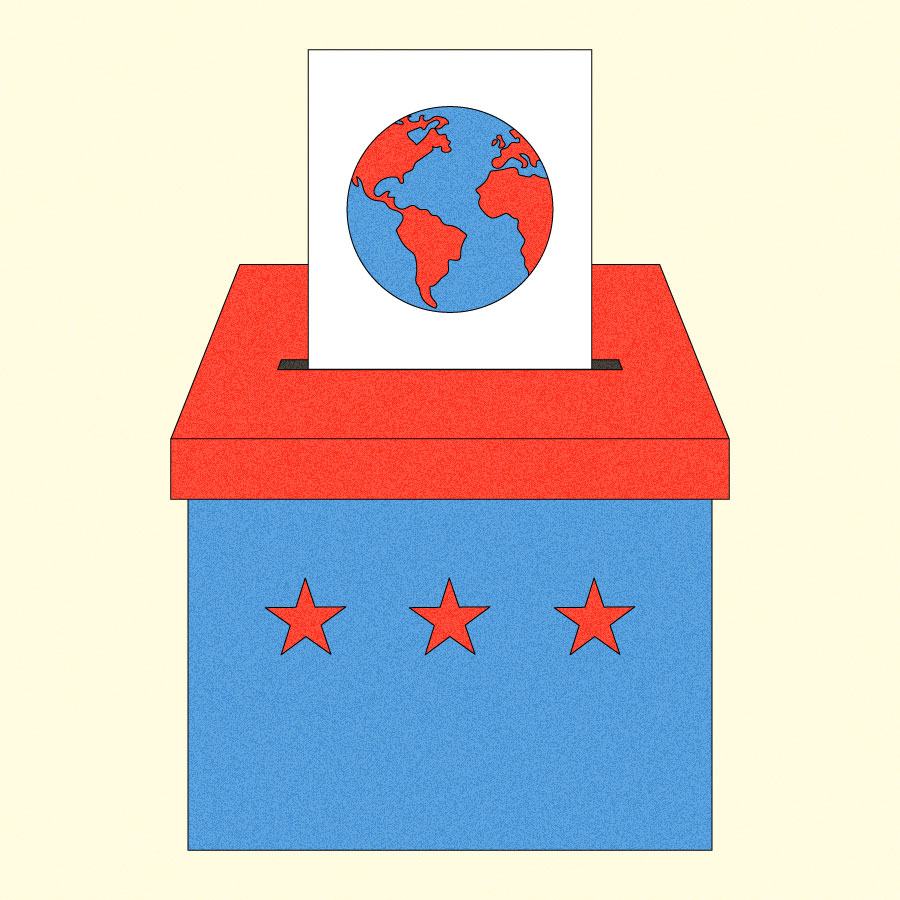
“For so long, we’ve assumed that when the climate crisis got bad enough, everybody would just wake up, come together, and solve it in some grand ‘kumbaya’ moment — and that’s not necessarily how the story will go. When crises get worse and scarcity gets worse, sometimes it gets harder to love your neighbor. And there is no doubt in my mind that the empathy and respect we will need for our fellow citizens in order to address the climate crisis can only exist in a healthy democracy.”
— Nathaniel Stinnett, executive director of the Environmental Voter Project
Climate change poses a threat to democracy. That threat has manifested in some immediate ways this year, with freakishly strong hurricanes ripping through the southeastern U.S., damaging roads and polling places and interrupting mail service. Researchers have also found that the impacts of climate change could provide fertile ground for authoritarianism.
On the flipside, participating in democracy is crucial for ambitious climate policy. You’ve almost certainly heard it before: One of the single most important things you can do to make your voice heard and stand up for the issues you care about is vote.
“I think it is worth stressing that we have an absurdly large number of solutions to all of the climate problems we are faced with,” said Nathaniel Stinnett, the executive director of the Environmental Voter Project. “We just have politicians who don’t want to enact those solutions — and that lack of political will to force politicians to lead on climate is a real problem.”
He founded the Environmental Voter Project to address that problem, by identifying environmentalists who don’t vote and using behavioral science to try and turn them into more consistent voters — creating a stronger voting bloc for the climate. “At the end of the day, politicians always go where the votes are because they love winning elections,” Stinnett said. “That, more than any other reason you can come up with, is why anybody who cares about climate change needs to show up and vote, because it’s power just sitting there waiting for us to grab it.”
The organization is driven by data — and it’s already seeing some promising results for 2024. According to a press release shared on Monday, over 214,000 first-time climate voters have already cast ballots in the U.S. presidential election, across the 19 states the organization works in. And in some key swing states, climate-identified voters generally seem to be outperforming other early voters. In Pennsylvania, for instance, 12.8 percent of registered voters had already cast ballots, and 21.7 percent of climate voters had, Stinnett told me when we spoke last week.
Still, participating in democracy remains easier for some than others. Voter suppression is alive and well in 2024, as some groups, fueled by the conspiracy theory that the 2020 election was stolen, are ramping up efforts to purge voter rolls, among other tactics. And those efforts hurt the climate movement.
“Laws have been put in place that are designed to make it harder for young people and people of color to vote,” Stinnett said. “And this has been historically the case — there’s nothing shocking or new about this — but we continue to see in our data that young people and people of color are the heart of the modern environmental movement. And so these laws disproportionately impact the climate and environmental movements.”
The pernicious thing about voter suppression, he said, is that it seeps into cultural consciousness. When people believe that voting is complicated — or when they are aware that it is, in fact, more difficult for them than for others — they may simply opt out.
The Environmental Voter Project is one organization working to combat this, by sharing information to demystify the process and helping people make a plan to vote.
You, too, can help make it easier for more people to cast their votes — in some low-key (and even fun!) ways. If you’re feeling an ever-increasing sense of anxiety and dread in these waning days before the 2024 election (hi! same!), getting involved may be one way to quell those feelings. Read on for five ways you can help get out the vote.
![]()
Environmental Voter Project has opportunities for volunteers looking to make calls to voters, specifically targeted to non-active voters who list the environment as their top concern. “Just over the last five days of the election, so November 1 through November 5, we’re looking to fill 4,825 phone-banking shifts,” Stinnett said. Modern phone-banking technology enables volunteers to do this from a computer, using a system that automatically dials the target numbers and shows the calls as coming from the organization, shielding the individual volunteer’s phone number. Find out more here.
The organization also has canvassing opportunities for environmental voters in Philadelphia; Pittsburgh; Austin, Texas; and Tucson, Arizona. If you’re in any of those cities and interested in going door-to-door to get out the vote, you can sign up here.
Lead Locally is another organization working to rally the environmental vote, by focusing on building support for down-ballot candidates with strong climate platforms. It has two more “Calls for Climate” events before election day — one is today, October 30, and another is Monday, election eve. You can learn more and sign up here.
Do you have an electric car? And do you live in Arizona, Florida, Georgia, Kentucky, Michigan, Nevada, North Carolina, Ohio, Pennsylvania, Texas, or Wisconsin? If so, you can volunteer to give people rides to the polls with ChargeTheVote, a nonpartisan initiative to boost voter turnout and slash transportation emissions on Election Day. Learn more here.
If you don’t drive an EV, there are still ways to help out with transportation. Look for groups in your area — for instance, Drive Your Ballot is one nonprofit operating in Pennsylvania, coordinating volunteer drivers as well as volunteers who can help organize ride dispatches. Check it out here.
And you can always take a more personal approach, too: Plan a voting carpool with friends, family, coworkers, etc. Studies have shown that something as simple as making a plan with someone can increase the likelihood that a person will follow through on their intention of voting.
Beyond simply getting there, a long line at the polls can be a formidable barrier for many — and, historically, voters in Black and brown neighborhoods face longer wait times on Election Day. Having access to food and water can help ease some of the burden of having to wait. Pizza to the Polls coordinates pizza deliveries (it also has a food truck program) to places where there are long lines. Anyone can report a crowded polling location online and then help coordinate the pizza delivery. There’s also an option to preorder, for nonprofits and other groups planning events for voter registration and turnout.
Do keep in mind that every state has some form of restrictions on the activities that can take place near voting locations, and for some, that extends to offering sustenance (sometimes known as “line warming.”) For instance, in Georgia, it’s illegal to offer free food or water within 150 feet of a polling place. Still, local groups are finding ways around these restrictions.
What about the bigger picture, you might ask? There are, of course, many ways that states and the national government could make it easier for people to vote. One idea is to make Election Day a federal holiday, so that working people would be able to make it to the polls more easily.
If you like that idea, and if you’re the sort of person who calls up your representative in Congress (or if you’re even curious about calling up your representative in Congress) you could do so to express support for the Election Day Holiday Act, a bill introduced by California Representative Anna Eshoo this year.
If you’ve made it this far in the newsletter, you probably care at least a little bit about voting, and ensuring that others are able and motivated to vote, too. A final, very simple action you can take to encourage those around you to vote is to let them know that you have.
“Often the best thing you can do is be loud and proud about the fact that you are a climate voter,” Stinnett said. “We think it’s so satisfying when we can rationally convince people to do things. But the truth is we’re more social animals than we are rational animals.”
He cited a 2012 study published in Nature, which found Facebook users were more likely to vote when they received a message about voting that included profile pictures of their friends who had already voted. It may sound silly, Stinnett said, but human beings are constantly looking at one another to figure out what behavior is good and appropriate. Don’t waste time (and emotional labor) trying to craft the perfect argument to convince somebody to vote, he said. “If you, on social media or in real life, make it very clear that you are a voter because that’s integral to who you are as an environmentalist, or as a good neighbor, or as a good child, or as a good parent, then anybody else who wants to be those things will say, ‘Oh, I wanna be a good environmentalist, so I should vote, too.’”
— Claire Elise Thompson
In the spirit of being a loud and proud voter, here is a picture of me (and my dog) dropping off my own ballot yesterday in Seattle! I did it! As is the way in Washington state, the ballot showed up in my mailbox a couple weeks ago, and the drop box was a mere 15-minute walk from my house. (I also could have put it in the mail, with no postage required.)
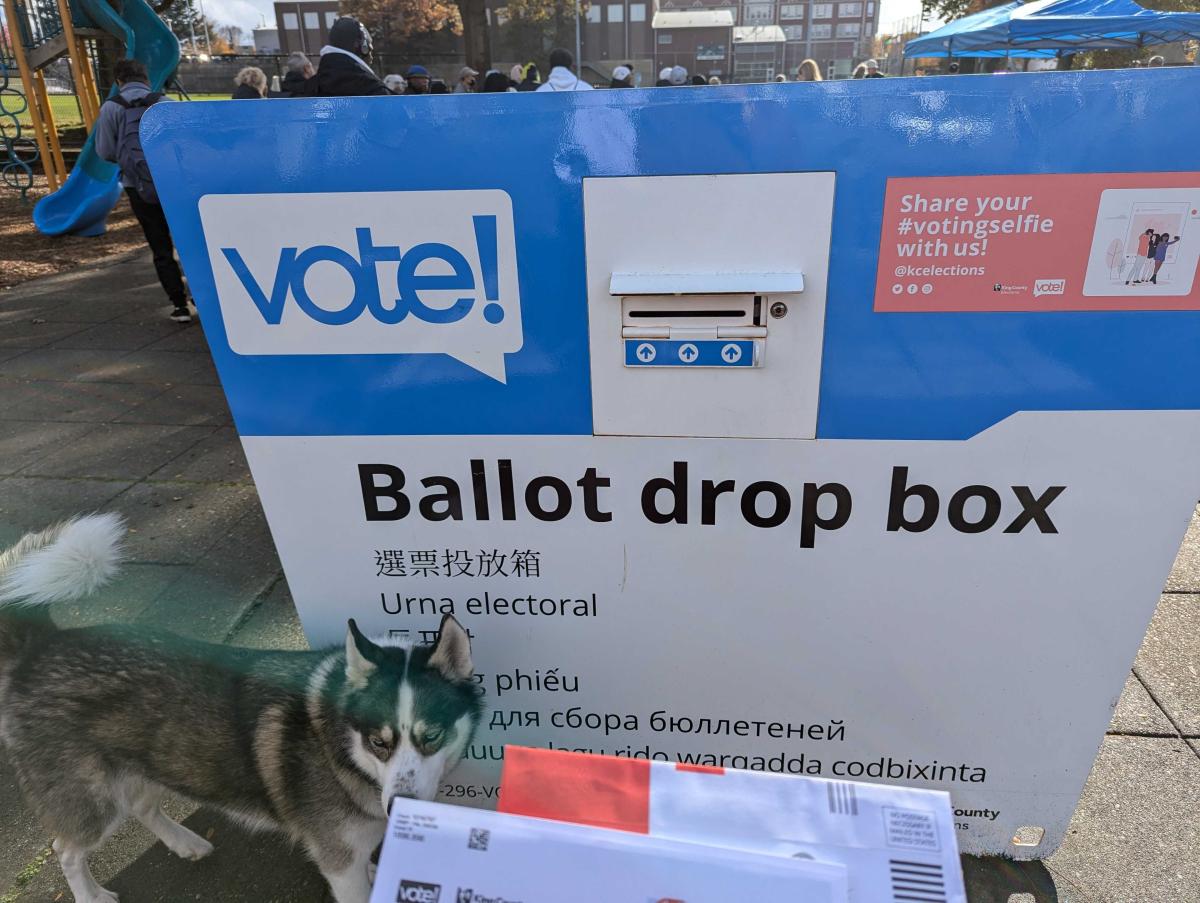
This story was originally published by Grist with the headline 5 ways to get out the vote for climate in the final days before the U.S. presidential election on Oct 30, 2024.
This content originally appeared on Grist and was authored by Claire Elise Thompson.
This post was originally published on Radio Free.
This content originally appeared on Democracy Now! and was authored by Democracy Now!.
This post was originally published on Radio Free.
This content originally appeared on Democracy Now! and was authored by Democracy Now!.
This post was originally published on Radio Free.
This content originally appeared on Democracy Now! and was authored by Democracy Now!.
This post was originally published on Radio Free.
This content originally appeared on Democracy Now! and was authored by Democracy Now!.
This post was originally published on Radio Free.
This content originally appeared on Democracy Now! and was authored by Democracy Now!.
This post was originally published on Radio Free.
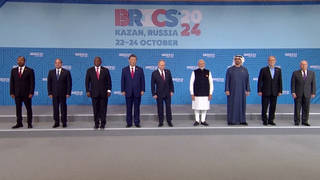
Will the BRICS economic and political alliance change the world’s U.S.-centered balance of power? As the annual BRICS summit wraps up in Russia, we host a debate between American economist Richard Wolff and South African sociologist Patrick Bond over the significance of the conference. This year, the nine BRICS countries invited 13 new “partner states” into their alliance, which Wolff calls “historic” and “a serious economic competitor to the United States and its role in the world.” Bond, on the other hand, argues that BRICS should be considered a “subimperial” formation, which expands and legitimates the existing world economic system rather than truly disrupting it.
This content originally appeared on Democracy Now! and was authored by Democracy Now!.
This post was originally published on Radio Free.
This content originally appeared on Democracy Now! and was authored by Democracy Now!.
This post was originally published on Radio Free.
This content originally appeared on Democracy Now! and was authored by Democracy Now!.
This post was originally published on Radio Free.
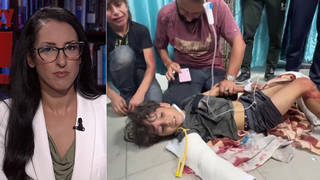
As human rights groups continue to call out war crimes committed by the Israeli military, we speak to the only U.S. diplomat to publicly resign from the Biden administration over its policy on Israel. We first spoke to Hala Rharrit when she resigned from the State Department in April, citing the illegal and deceptive nature of U.S. policy in the Middle East. “We continue to willfully violate laws so that we surge U.S. military assistance to Israel,” she says after more than a year of Israel’s war on Gaza. Rharrit says she found the Biden administration unmovable in its “counterproductive policy,” which she believes has gravely harmed U.S. interests in the Middle East. “We are going to feel the repercussions of that for years, decades, generations.”
This content originally appeared on Democracy Now! and was authored by Democracy Now!.
This post was originally published on Radio Free.
This content originally appeared on Democracy Now! and was authored by Democracy Now!.
This post was originally published on Radio Free.